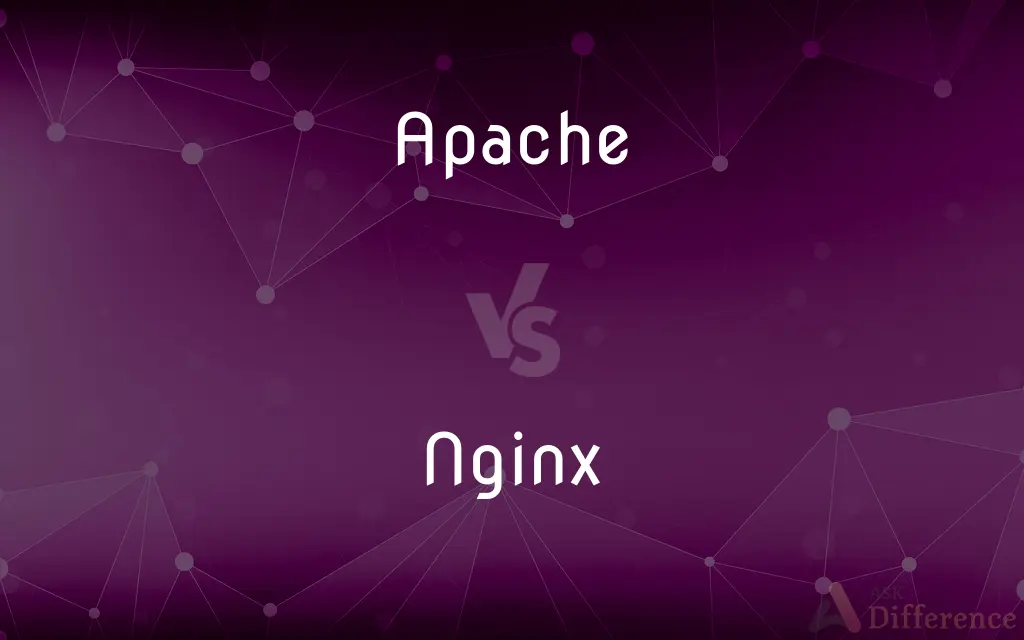Apache vs. Nginx — What's the Difference?
By Fiza Rafique & Maham Liaqat — Published on August 15, 2024
Apache offers extensive flexibility and customization through dynamic modules, catering to diverse web needs. Nginx excels in handling high concurrency with its event-driven architecture, giving superior performance for static content and load balancing.

Difference Between Apache and Nginx
Table of Contents
ADVERTISEMENT
Key Differences
Apache operates on a process-driven or thread-driven architecture, allowing each request to have its own thread, which can be beneficial for complex applications requiring extensive backend processing. On the other hand, Nginx utilizes an asynchronous, event-driven approach, efficiently managing multiple requests within a single thread, which reduces the resource consumption and increases the capacity to handle numerous simultaneous connections, making it ideal for high traffic websites.
Apache's configuration system is highly flexible, offering .htaccess files for directory-level configuration, allowing users to make changes without accessing the main server configuration. This is particularly useful for shared hosting environments. Nginx, however, does not support .htaccess files, requiring all configuration to be done at the server level, which can lead to enhanced performance but less flexibility in shared environments.
Nginx was designed with performance optimization in mind, particularly for serving static content quickly and proxying requests. It shines in scenarios where a server needs to handle a large number of concurrent connections efficiently. Apache, while not as efficient in handling high concurrency by default, can be optimized with modules like mod_php for improved performance, offering a versatile solution suitable for a wide range of web applications.
Apache's modularity allows for a broad range of functionalities to be added or removed as needed, making it a highly customizable web server solution. It supports a variety of programming languages natively, such as PHP, Python, and Perl. Nginx, while less flexible in terms of modularity, provides essential features out of the box, focusing on speed and efficiency, and can serve as a reverse proxy or load balancer in addition to a web server.
While Apache's configuration might seem more complex due to its extensive customization options, it provides a more straightforward approach for developers familiar with dynamic web applications. Nginx offers a simpler configuration for high-performance websites, making it a go-to choice for static sites, reverse proxy configurations, and load balancing, especially when handling high volumes of traffic.
ADVERTISEMENT
Comparison Chart
Architecture
Process/thread-driven
Event-driven
Concurrency
Handles fewer connections with more resources
Handles many connections efficiently
Configuration Flexibility
.htaccess for directory-level config
Server-level configuration, no .htaccess
Performance
Flexible, with a focus on dynamic content
Optimized for static content, reverse proxying
Modularity
Highly modular, customizable
Less modular, focused on core efficiency
Use Case
Dynamic web applications, shared hosting
High traffic websites, static content, load balancing
Compare with Definitions
Apache
Can be optimized for performance.
Apache configurations can be tuned for better handling of concurrent connections.
Nginx
Ideal for serving static content and load balancing.
Nginx is often chosen for its superior handling of static files and as a reverse proxy.
Apache
A flexible web server with dynamic module support.
Apache can be customized with mods like mod_php for diverse web applications.
Nginx
Offers out-of-the-box efficiency.
Nginx excels in environments requiring fast response times and low memory usage.
Apache
Known for .htaccess flexibility.
Apache allows for easy per-directory configurations without server restart.
Nginx
Simplifies high traffic website management.
Nginx is preferred for sites with a large number of simultaneous connections.
Apache
Suits complex, dynamic web applications.
Apache is often used in shared hosting for its extensive backend support.
Nginx
A high-performance web server using an event-driven approach.
Nginx efficiently serves static content and manages high concurrency.
Apache
Preferred for extensive modularity.
Apache's module system allows adding or removing functionalities as needed.
Nginx
Lacks .htaccess support, favoring server-level config.
Nginx configurations ensure streamlined performance tuning.
Common Curiosities
Which web server is better for high traffic websites?
Nginx is generally considered better for high traffic websites due to its ability to handle numerous concurrent connections efficiently with its event-driven architecture.
Can Apache serve static content as efficiently as Nginx?
While Apache can serve static content, Nginx is specifically optimized for this purpose, offering faster performance in delivering static files.
Can Nginx serve dynamic content as well as Apache?
Nginx can serve dynamic content, especially when used in conjunction with a backend application server, but Apache offers more direct support for dynamic content through modules like mod_php.
Is Nginx always faster than Apache?
Nginx is typically faster in serving static content and handling high concurrency, but Apache can be optimized to improve its performance, making the choice dependent on the specific use case and configuration.
What is the main architectural difference between Apache and Nginx?
Apache uses a process/thread-driven architecture, while Nginx employs an event-driven model, making Nginx more efficient at handling multiple concurrent connections.
Which server is easier to configure for beginners?
Nginx is often considered simpler to configure for basic setups due to its straightforward configuration syntax. Apache's configuration might seem more complex due to its flexibility and the use of .htaccess files, which can introduce additional layers of configuration.
Which server has better support for modern web technologies like WebSocket?
Nginx has built-in support for WebSocket, making it a popular choice for applications requiring real-time communication. Apache can support WebSocket through additional modules, but Nginx's support is more direct and often considered more efficient.
How do Apache and Nginx handle configuration changes?
Apache supports .htaccess for directory-level configuration changes without server restarts, whereas Nginx requires all configurations to be done at the server level, enhancing performance but reducing flexibility.
How do Apache and Nginx compare in terms of SSL/TLS performance?
Nginx is often cited for its efficient handling of SSL/TLS connections due to its event-driven architecture, which can manage thousands of connections simultaneously without significant resource consumption. Apache can also handle SSL/TLS efficiently but may require more resources to achieve similar performance levels as Nginx.
What are the security implications of using Apache vs. Nginx?
Apache and Nginx both offer robust security features, but their architecture affects how security is managed. Apache's .htaccess allows for granular security controls at the directory level, while Nginx's event-driven model may offer a smaller attack surface due to fewer running processes.
Can Apache and Nginx be used together?
Yes, Apache and Nginx can be used together in a reverse proxy setup, where Nginx serves as the front-end handling static content and SSL/TLS termination, while Apache handles dynamic requests. This combines Nginx's efficiency with Apache's flexibility.
What impact do Apache and Nginx have on SEO?
Neither Apache nor Nginx directly affects SEO. However, website speed, uptime, and security, which can be influenced by web server choice, play significant roles in SEO performance. Nginx's ability to handle high traffic with fast response times can positively impact SEO, as can Apache's flexibility with URL rewrites and redirects.
How do Apache and Nginx handle PHP processing?
Apache can process PHP natively using modules like mod_php, making it easier to set up for PHP applications. Nginx does not process PHP natively; it typically forwards PHP requests to a separate PHP processor like PHP-FPM (FastCGI Process Manager), which can add complexity but also offers performance advantages in high-load environments.
What are the licensing differences between Apache and Nginx?
Apache is released under the Apache License 2.0, a permissive free software license that allows users to use the software for any purpose, to distribute it, to modify it, and to distribute modified versions of the software. Nginx is distributed under a similar 2-clause BSD-like license for its free version, with its commercial version, Nginx Plus, offering additional features and support under a proprietary license.
Are there any specific scenarios where Apache outperforms Nginx?
Apache may outperform Nginx in environments where per-directory configurations, such as those provided by .htaccess files, are heavily used or when specific Apache modules provide functionality that Nginx cannot directly match. Apache's architecture also makes it highly customizable for complex web application environments.
How does the community support compare between Apache and Nginx?
Both Apache and Nginx have large, active communities. Apache has been around longer, so there's a wealth of documentation, forums, and third-party modules available. Nginx's community is also strong, particularly among high-traffic, modern web applications, with plenty of resources and support available.
Share Your Discovery

Previous Comparison
BB Cream vs. CC Cream
Next Comparison
Role Conflict vs. Role StrainAuthor Spotlight
Written by
Fiza RafiqueFiza Rafique is a skilled content writer at AskDifference.com, where she meticulously refines and enhances written pieces. Drawing from her vast editorial expertise, Fiza ensures clarity, accuracy, and precision in every article. Passionate about language, she continually seeks to elevate the quality of content for readers worldwide.
Co-written by
Maham Liaqat












































